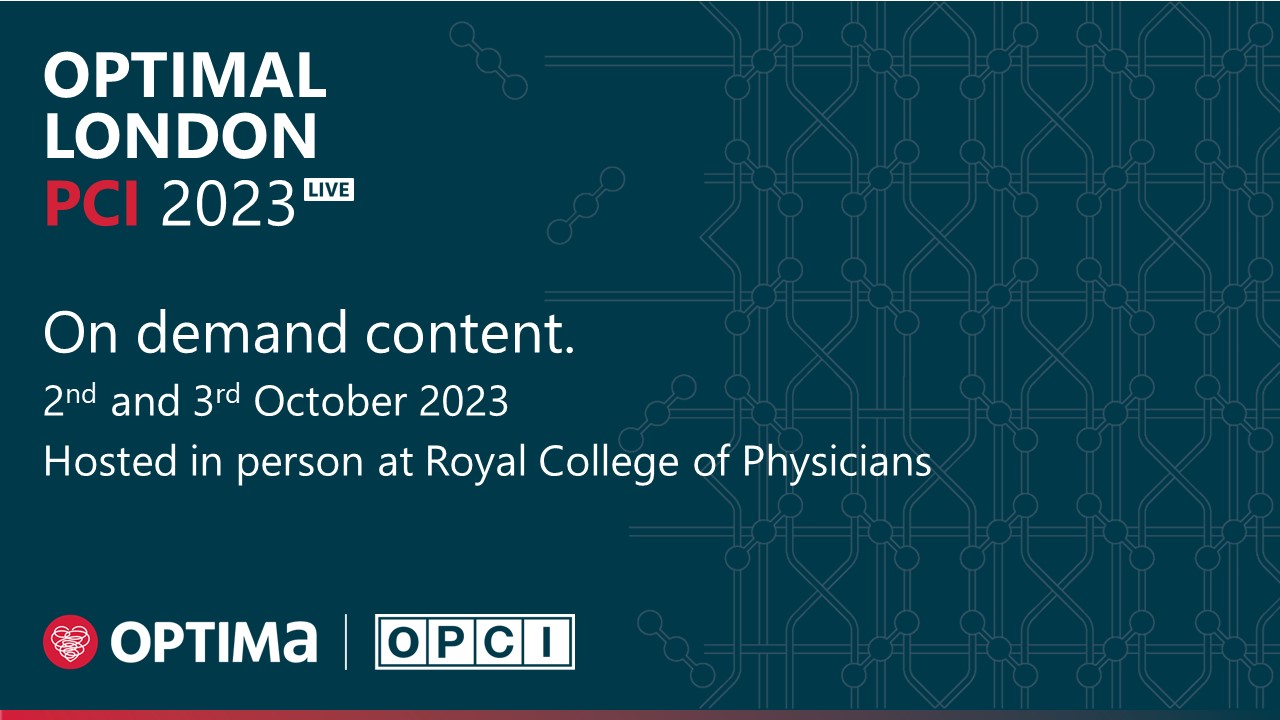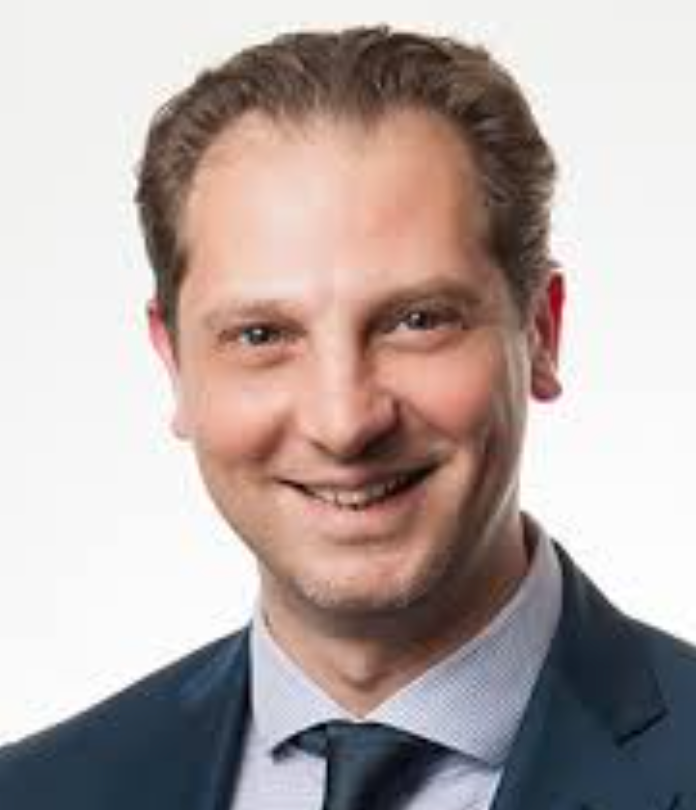Optimal PCI London 2023
Published: 13 October 2023
-
Views:
 3684
3684
-
Likes:
 7
7
-
Views:
 3684
3684
-
Likes:
 7
7
-
 Up Next
Up Next -
 26m 49sPart 1 | Session 3 Point and shoot? Planning fundamentals
26m 49sPart 1 | Session 3 Point and shoot? Planning fundamentals -
 15m 12sPart 1 | Session 4 Confusion or clarity? How to negotiate the information matrix
15m 12sPart 1 | Session 4 Confusion or clarity? How to negotiate the information matrix -
 44m 1s
44m 1s -
 7m 28sPart 1 | Session 6 What we learned and should look for in the interactive session
7m 28sPart 1 | Session 6 What we learned and should look for in the interactive session
-
 13m 57sPart 2 | Session 1 Calcium – it’s all sorted?
13m 57sPart 2 | Session 1 Calcium – it’s all sorted? -
 27m 35sPart 2 | Session 2 Gone, but not forgotten – Calcified nodules
27m 35sPart 2 | Session 2 Gone, but not forgotten – Calcified nodules -
 10m 3sPart 2 | Session 3 Calcium in special scenarios
10m 3sPart 2 | Session 3 Calcium in special scenarios -
 1h 6m 45s
1h 6m 45s -
 4m 56sPart 2 | Session 5 What we learned and should look for in the interactive session
4m 56sPart 2 | Session 5 What we learned and should look for in the interactive session
-
 4m 53sPart 3 | Session 1 Welcome and recap
4m 53sPart 3 | Session 1 Welcome and recap -
 4m 28sPart 3 | Session 2 My stents last forever, why should I listen?
4m 28sPart 3 | Session 2 My stents last forever, why should I listen? -
 10m 38sPart 3 | Session 3 Doom loop, or durable solution, how can I navigate?
10m 38sPart 3 | Session 3 Doom loop, or durable solution, how can I navigate? -
 40m 24sPart 3 | Session 4 Algorithmic ISR treatment: what could go wrong?
40m 24sPart 3 | Session 4 Algorithmic ISR treatment: what could go wrong? -
 1h 2m 42s
1h 2m 42s
-
 12m 29sPart 4 | Session 1 Too tough to treat – the high-risk landscape
12m 29sPart 4 | Session 1 Too tough to treat – the high-risk landscape -
 21m 23sPart 4 | Session 2 Mapping the path: hemodynamics to delineate risk and define strategy
21m 23sPart 4 | Session 2 Mapping the path: hemodynamics to delineate risk and define strategy -
 11m 57sPart 4 | Session 3 Crossing the crucible: strategies for high-risk CTO PCI in LV dysfunction
11m 57sPart 4 | Session 3 Crossing the crucible: strategies for high-risk CTO PCI in LV dysfunction -
 5m 11sPart 4 | Session 4 What we learned and should look for in the interactive session
5m 11sPart 4 | Session 4 What we learned and should look for in the interactive session
-
 4m 6sPart 1 | Session 1 Welcome and introduction James Spratt
4m 6sPart 1 | Session 1 Welcome and introduction James Spratt
Overview
Radcliffe are delighted to partner with Optima Education to host the on-demand Optimal PCI London 2023 event.
Optimal PCI London 2023 was a hybrid two-day event held on the 2–3 October at The Royal College of Physicians, London, UK. With over 20 expert faculty, it focused on six complex, high-risk intervention topics: pre-procedural planning, imaging, calcium, stent failure, left main PCI and CTO / LV support.
Optima is proud to partner with OPCI (NYC), to bring you the next instalment in leading cardiology education.
At Optima, we believe that education is central to patient care. Our unique approach is designed to help you develop the thinking, skills and knowledge to optimise patient care. We clarify and simplify clinical messaging into engaging and accessible content. Our values of quality, simplicity and innovation are central to this vision.
Optima would like to thank the following sponsors:
Lead: Shockwave Medical, Boston Scientific and Abbott
Supporting: ASAHI INTECC, Teleflex, Vascular Perspectives, HeartFlow, Medtronic, CathWorks, Cordis, Abiomed, Philips, GE Healthcare, Seigla Medical, RAMPART, HCA Healthcare and CoreAalst

Learning Objectives
- Understand the main elements in pre-procedural planning and how it guides PCI
- Explore the role of coronary arterial calcium in driving adverse outcomes, how to assess and treat these patients safely
- Understand what causes stent failure, how this is assessed and what drives treatment options in each case
- Explore the role of left ventricular support in complex coronary artery disease
Target Audience
- Interventional Cardiologists
- Interventional Cardiology Nurses
- Cathlab Personnel
- Interventional Fellows
More from this programme
Part 1
Day 1, Session 1: Pre-procedure planning – are we lost without a map?
Part 2
Day 1, Session 2: Coronary calcium – too hard to crack?
Part 3
Day 2, Session 3: Stent failure – can we ignore this?
Part 4
Day 2, Session 4: High-risk and complex – too tough to treat?
Faculty Biographies

Allen Jeremias
Director of Interventional Cardiology Research and Associate Director, Cardiac Catheterization
Dr Allen Jeremias, MD, MSc is an interventional cardiologist at St. Francis Hospital, Roslyn, NY and Director of Interventional Cardiology Research and Associate Director of the Cardiac Catheterization Laboratory. He is also the Director of the Physiology Core Laboratory at the Cardiovascular Research Foundation, New York, NY.
Dr Jeremias earned his medical degree at Heinrich-Heine-University School of Medicine in Düsseldorf, Germany, and a Master of Science degree at Harvard Medical School. He completed his medical training at The Cleveland Clinic Foundation, Stanford University School of Medicine, as well as Beth Israel Deaconess Medical Center, Harvard Medical School.






Comments